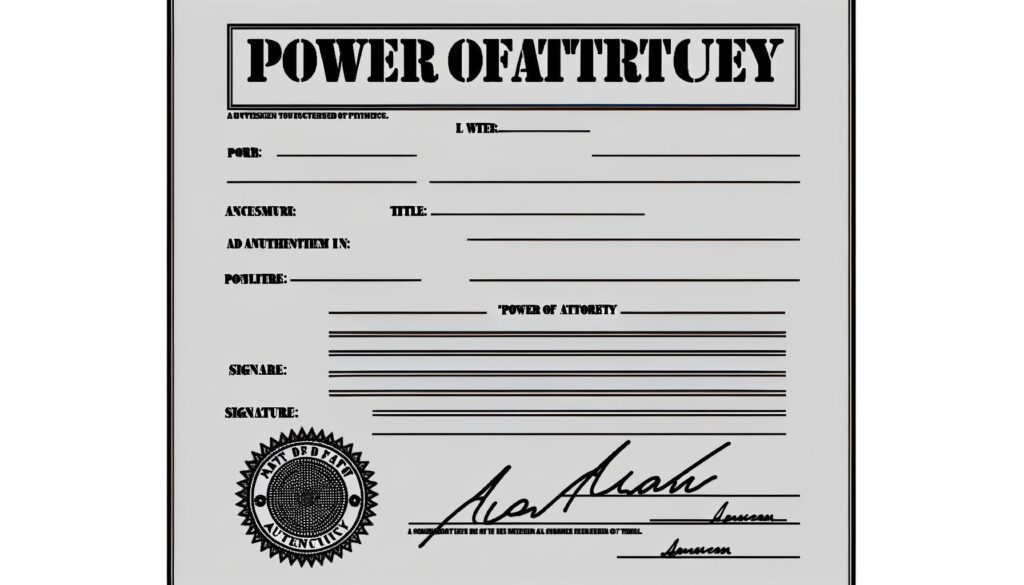As we age, the need for safeguarding our financial and healthcare decisions becomes increasingly crucial. A power of attorney (POA) serves as a legal document that allows an individual to designate another person to make decisions on their behalf if they become unable to do so. For seniors living in Tustin, having a POA in place is not just beneficial but essential to ensure their wishes are honored and their affairs remain well-managed.
The significance of establishing a POA for Tustin seniors cannot be overstated. This legal arrangement offers peace of mind by enabling seniors to select who will act in their stead; this person is known as the attorney-in-fact or agent.
The responsibilities of an attorney-in-fact can range from managing finances and paying bills to making critical healthcare decisions. Choosing someone trustworthy and reliable is paramount, as this person will have significant authority over important aspects of the senior’s life.
Understanding who can serve as an attorney-in-fact and what their duties entail helps highlight why this role is vital. Seniors often choose close family members, friends, or trusted professionals who are well-versed in handling such responsibilities.
An appointed attorney-in-fact must always act in the principal’s best interest, maintaining transparency and responsibility in all actions taken on behalf of the senior. By planning ahead with a comprehensive POA, Tustin seniors can ensure that their preferences are respected and effectively managed, even when they are no longer able to communicate them directly.
Types of Power of Attorney and Their Specific Uses
A Power of Attorney (POA) is a robust legal tool that comes in various forms, each tailored to specific needs and situations. Understanding the types of POAs and their specific uses can help Tustin seniors make informed decisions about which type best suits their circumstances.
There are four primary types of Power of Attorney: General, Limited, Durable, and Healthcare. A General POA grants broad powers to the attorney-in-fact, allowing them to handle most aspects of the senior’s life, from financial transactions to personal affairs. This might be suitable for seniors who need comprehensive assistance due to declining health or cognitive issues.
In contrast, a Limited POA provides authority only for specified tasks or a defined period. For instance, a senior might grant a Limited POA for someone to manage their finances while they recover from surgery but retain control over other matters.
Another crucial distinction lies between Durable POA and Healthcare POA. A Durable POA remains in effect even if the senior becomes incapacitated, ensuring that someone can always manage their affairs without needing court intervention. This type is especially valuable for long-term planning as it eliminates the uncertainty associated with potential future incapacity.
Meanwhile, a Healthcare POA specifically focuses on medical decisions. It empowers an appointed individual to make healthcare choices that align with the senior’s wishes during times when they cannot express consent themselves-such as major surgeries or end-of-life care decisions.
Each type of Power of Attorney has unique applications and requires thoughtful consideration based on individual needs. Seniors should evaluate scenarios like managing routine financial obligations versus making sensitive healthcare decisions and choose accordingly. By understanding these distinctions, Tustin seniors can better utilize the power of attorney to safeguard their interests comprehensively.
Financial Management
A power of attorney can be an invaluable tool for efficient financial management, especially for seniors who may need assistance in organizing their financial affairs. By designating a trusted attorney-in-fact through a POA, seniors ensure that their bills are paid on time, investments are handled prudently, and financial transactions are executed seamlessly. This arrangement not only protects the senior’s assets but also alleviates the mental burden associated with managing complex finances.
One of the significant benefits of having a power of attorney is having a reliable individual to oversee and monitor financial activities. This person can take care of paying monthly expenses, handling banking needs, and even filing taxes on behalf of the senior. When selected carefully, an attorney-in-fact can make informed decisions that protect against potential mismanagement or oversight. Given the risks associated with elder financial abuse, this legal arrangement can serve as a robust safeguard against exploitation.
Scenarios where power of attorney proves crucial include situations like sudden medical emergencies or unexpected travel that might inhibit a senior from managing their finances personally. If a senior is hospitalized or incapacitated-temporarily or permanently-the designated agent can step in immediately to manage financial responsibilities without interruption. The POA also plays a critical role in complicated family dynamics by preventing conflicts over who should handle financial matters when seniors are no longer able to do so themselves.
| Benefit | Description |
|---|---|
| Timely Bill Payments | Ensures all bills are paid on time, avoiding late fees and penalties. |
| Asset Protection | Safeguards against mismanagement, ensuring prudent investment and spending. |
| Fraud Prevention | Minimizes risk of elder financial abuse through oversight by a trusted individual. |
Having someone trusted to manage one’s finances means peace of mind not just for the seniors but also for their families. It assures them that there will be no chaos regarding funds if something unforeseen happens. Through proactive steps like establishing a POA, Tustin seniors can maintain control over their assets while effectively planning for any eventuality.

Healthcare Decisions
A healthcare power of attorney plays a pivotal role in ensuring that the medical wishes of seniors are honored, especially in situations where they may not be able to communicate their preferences. This type of POA designates a trusted individual to make healthcare decisions on behalf of the senior, providing clear guidance to medical professionals about treatments, medications, and other care-related choices.
Having a healthcare POA is critical because it ensures that medical interventions align with the senior’s values and desires, thus avoiding unwanted procedures or treatments.
Consider situations where urgent and complex medical decisions are necessary-such as during surgeries, emergency room visits, or end-of-life care. In these circumstances, having an appointed agent who understands the senior’s medical history and personal wishes can be invaluable. For example:
- A senior undergoing complex surgery might prefer more aggressive treatment.
- Another might choose comfort care over extensive life-sustaining measures.
The power of attorney for healthcare not only respects and honors these presumptions but also eliminates ambiguities during critical moments when every decision counts.
Moreover, establishing a healthcare POA helps prevent potential disputes among family members who might have differing opinions about what constitutes appropriate care for their loved ones. When one person is legally recognized to make health-related decisions:
- It provides clarity to all parties involved.
- Reduces stress during emotional times.
- Ensures that the senior’s documented wishes are followed accurately.
Ultimately, this legal tool offers reassurance that their well-being is managed according to their own standards and beliefs while underlining the importance of preemptive planning in making informed and compassionate healthcare resolutions for Tustin seniors.
Legal Protection and Peace of Mind for Families
A power of attorney offers significant legal protections for Tustin seniors and their families. By designating a trusted individual as an attorney-in-fact, seniors can ensure that their financial, medical, and legal matters are handled responsibly if they become incapacitated. This delegation acts as a preemptive measure to avoid the potentially costly and lengthy process of court-appointed guardianship.
In most cases, the court process involves multiple steps including petitioning the court, hearings, and ongoing reporting requirements. With a well-executed power of attorney, these complications are largely avoided.
The peace of mind provided by a power of attorney cannot be understated. For families, knowing that there is a legally binding document that names who will make decisions on behalf of their loved one can prevent unnecessary stress during difficult times.
In situations where health emergencies or sudden declines in cognitive abilities occur, having a designated decision-maker ensures that there is no ambiguity about who has the authority to act. This clear delineation helps mitigate family disputes and maintains harmony among relatives, who otherwise might wrestle over decision-making roles.
To further highlight its benefits, avoiding court-appointed guardianship means significant savings in both time and money. Besides avoiding legal fees associated with court processes, it allows for quicker implementation of necessary actions such as the sale of assets or approval of medical treatments. A power of attorney effectively bridges this gap by ensuring continuity in management without requiring judicial oversight steps which could delay urgent needs.
| Aspect | Power of Attorney | Court-Appointed Guardianship |
|---|---|---|
| Decision Process | Immediate authority to act once incapacitated | Requires petitioning the court |
| Costs | Relatively minimal (attorney fees) | Potentially high (court fees & ongoing monitoring) |
| Timeframe | Quick action upon incapacitation | Lengthy due to hearings and approvals needed |
| Family Stress Levels | Diminished through clear delegation in advance | Might escalate due to unclear responsibilities until guardianship established |
Overall, establishing a power of attorney provides substantial legal protections while promoting peace of mind for all involved parties by anticipating future needs today.
How to Establish a Power of Attorney in Tustin
Identifying the Type of POA Needed
Establishing a power of attorney in Tustin begins with identifying which type of POA best suits the senior’s needs. Consider whether a general, limited, durable, or healthcare POA is most appropriate. For example, if the senior’s primary concern is having someone manage financial affairs and make routine transactions on their behalf, then a general or durable POA might be suitable.
Conversely, if the main concern is about ensuring specific medical treatments align with personal wishes during periods when they cannot communicate, then a healthcare POA would be essential. Understanding these needs will guide residents through the initial steps of legal preparation.

Preparing Necessary Legal Documentation
Once the type of power of attorney has been determined, seniors need to gather and complete the essential legal documents required in California. The basic form for appointing an attorney-in-fact can be obtained from local legal aid services or directly from many law offices specializing in elder law. For general and durable POAs, two adults or a notary public must witness the senior’s signature to validate the document.
Healthcare POAs often require additional specific forms that outline the principal’s medical preferences. It’s vital that all documentation precisely reflects the senior’s choices and instructions to avoid any future ambiguities.
Consulting With an Elder Law Attorney
While some individuals may feel confident handling this process independently, it’s highly recommended to consult with an elder law attorney to ensure that everything is legally sound and tailored to specific needs. An experienced lawyer can provide insights into potential issues that may arise and offer advice on how best to structure terms within the power of attorney documents.
They can also anticipate any state-specific requirements unique to California or Orange County that should be addressed upfront for validity and enforceability.
Utilizing Local Resources
Tustin seniors have various local resources available to assist them in setting up a power of attorney. Organizations such as senior centers and community transitional programs often offer workshops and consultations about legal planning for older adults. These resources can provide additional support both in terms of understanding options available and ensuring that documents are appropriately prepared without incurring significant costs.
Creating a power of attorney involves careful planning and consideration but ensures peace of mind for both seniors and their families by protecting interests-whether financial or health-related-in situations where they cannot advocate for themselves directly.
Common Concerns and Misconceptions About Power of Attorney
Fear of Losing Control
One common concern among Tustin seniors is the fear of losing control over their own affairs after granting a power of attorney. Many worry that once they designate an attorney-in-fact, they will no longer be able to make decisions for themselves. However, it’s important to understand that a power of attorney can be tailored to fit individual needs and preferences.
For instance, a limited POA can grant specific powers only during certain situations or timeframes, while a durable POA ensures your wishes are carried out even if you become incapacitated. By clearly outlining the scope and terms in the legal documents, seniors can retain as much control as desired while still providing safeguards for future circumstances.
Mistrust and Reliability
Another significant misconception revolves around trustworthiness-seniors might feel uneasy about selecting someone who will have such broad authority over their lives. It’s essential to choose an attorney-in-fact who is not just trustworthy but also reliable and capable of handling responsibilities effectively.
Open communication is crucial; discussing expectations, duties, and even contingencies with the chosen person can mitigate fears. Additionally, incorporating checks and balances, like requiring dual signatures for financial transactions or sending regular updates to another trusted party, can provide added security and peace of mind.
Complexity and Legal Issues
Some seniors may perceive establishing a power of attorney as an overwhelmingly complex process fraught with legal challenges. They might worry about creating legally binding documents incorrectly or facing unforeseen consequences down the road. Consulting with an experienced attorney can alleviate these concerns by ensuring that all paperwork is completed accurately and comprehensively reflects the senior’s wishes.
Local resources in Tustin, such as elder law attorneys or community senior services, offer valuable support in navigating this process smoothly. With professional guidance, seniors can confidently set up a POA that both protects their interests and adheres to legal standards.
Real-Life Stories
Mary Thompson, an 82-year-old resident of Tustin, experienced firsthand the immense value of having a power of attorney in place. After being diagnosed with a degenerative neurological condition, Mary knew it was important to plan for her future healthcare and financial well-being. With her son, James, designated as her attorney-in-fact, Mary’s transition into needing greater assistance became much smoother.
When her condition started affecting her mobility and decision-making capabilities, James was able to handle her medical appointments, manage her finances, and ensure her bills were paid on time. This seamless control over important aspects of Mary’s life provided significant relief to both Mary and James during what could have been a stressful period.
Another compelling story involves John and Evelyn Harris, both in their late seventies and long-time Tustin residents. The couple decided early on to establish mutual durable powers of attorney following John’s early signs of dementia. For Evelyn, as John’s primary caregiver and spouse with power of attorney for healthcare decisions, this meant she could give informed consent for treatments John would have wanted if he were able to express his wishes himself.
When John’s condition worsened to the point where he could no longer communicate effectively, Evelyn did not face any legal hurdles in ensuring his continued care aligned with his previously stated preferences. This legal safeguard ensured that John’s dignity was maintained throughout his illness.

Then there’s the case of Luis Mendez, an 89-year-old widower who had no immediate family nearby but had a close relationship with his lifelong friend Roberto. Anticipating potential health issues due to aging and knowing that managing day-to-day tasks might become difficult, Luis appointed Roberto as his general power of attorney for financial decisions.
When Luis suffered a minor stroke that left him temporarily incapacitated, Roberto acted swiftly-paying bills on time and managing Louis’ investments-thus avoiding potential late fees or missed opportunities that might have exacerbated Louis’ financial standing. This arrangement underscored how even non-family members can play a critical role when trusted individuals are designated as attorneys-in-fact under the provisions established by the power of attorney documents.
These real-life examples highlight just how crucial it is for Tustin seniors to consider establishing power of attorney arrangements tailored to their specific needs and circumstances. By actively planning ahead with trusted appointees ready to step in when necessary, seniors can significantly alleviate potential distress and ensure their personal affairs are managed according to their wishes while providing peace of mind for themselves and their loved ones.
Conclusion
Establishing a power of attorney is an essential step for seniors in Tustin to ensure that their financial, healthcare, and legal matters are managed according to their wishes. As discussed throughout this article, having a trusted individual who can make decisions on their behalf can provide invaluable peace of mind and protection.
Whether it’s handling daily financial tasks or making critical healthcare choices, a power of attorney allows seniors to maintain control over their lives by designating someone they trust to act in their best interests.
Planning ahead and establishing a POA not only safeguards the well-being of seniors but also alleviates stress for their families. By proactively addressing potential issues related to incapacity or unforeseen medical emergencies, families can avoid the often lengthy and costly process of court-appointed guardianship. This forward-thinking approach ensures that seniors’ preferences are honored without delay or additional hurdles, providing clarity and direction during challenging times.
In conclusion, the importance of planning ahead cannot be overstated. A power of attorney serves as a powerful tool that enables Tustin seniors to protect their assets, manage their finances efficiently, and ensure that their healthcare wishes are respected.
We encourage all seniors and their families to consider establishing a POA as part of their comprehensive planning strategy. Consulting with legal experts and taking advantage of local resources can help ensure that the POA is tailored to meet each individual’s unique needs, ultimately safeguarding their future well-being and granting everyone involved the peace of mind they deserve.
Frequently Asked Questions
What Are the Rules for Power of Attorney in California?
In California, the rules for Power of Attorney (POA) require that the principal be of sound mind when creating the document. The POA must be signed by the principal and either notarized or witnessed by two adults to be valid.
The document grants authority to an agent to perform specific actions on behalf of the principal, which can include managing finances, making healthcare decisions, or handling property transactions. There are also restrictions and limitations regarding what an agent can do under a POA, especially in financial matters.
What Is the Best Power of Attorney to Have?
The best Power of Attorney to have depends on individual needs and circumstances. A General Power of Attorney allows broad decision-making power over financial and legal matters but is only valid while the principal is competent. Conversely, a Durable Power of Attorney remains in effect even if the principal becomes incapacitated, ensuring continuity in decision-making during critical times.
A Healthcare Power of Attorney specifically covers medical decisions. Combining a Durable POA with a Healthcare POA often provides comprehensive coverage suited for most situations.
What Is the Meaning of POA?
POA stands for Power of Attorney, a legal document granting one person (the agent) authority to act on behalf of another person (the principal). POAs can cover various responsibilities such as financial management, healthcare decisions, or legal affairs depending upon how they are structured and what powers are conferred within the document itself.
This arrangement ensures that someone’s affairs can continue to be managed according to their wishes if they become unable to oversee them personally due to illness, absence, or other reasons.
Can a Power of Attorney Transfer Money to Themselves California?
In California, an agent with Power of Attorney generally cannot transfer money or assets to themselves unless explicitly authorized in the POA document. Such actions are considered self-dealing and could potentially constitute abuse or violation of fiduciary duties imposed on the agent unless there is clear permission provided by the principal within the original agreement.
Misuse of these powers can lead to legal consequences including civil liability or criminal charges depending on circumstances.
Can a Bank Refuse to Honor a Power of Attorney in California?
Yes, a bank in California can refuse to honor a Power of Attorney if it has reason to believe there may be issues with its validity or authenticity. Concerns might arise about proper execution, potential fraud or forgery involved in signing it, not aligning with banking policies on file documentation requirements among others factors banks observe closely .
If refusals occur individuals should consult legal counsel who potentially remedy situation working directly institution resolve disputes ensuring document recognized permitting intended access manage relevant accounts appropriately.

